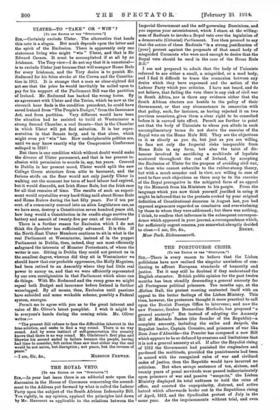ITLSTER--TO " TAKE " OR "WIN "p
[To ras Eimer. or ras eqirscraroa."
Si,—Certainly exclude Ulster. The alternative that heads this note is a slogan. But much depends upon the letter and the spirit of the Exclusion. There is apparently only one statesman living who might " win " Ulster, and that is Sir Edward Carson. It must be accomplished if at all by an Irishman. The Tory view—I do not say that it is unnatural— is to exclude Ulster just because that will mosque? Home Rule for every Irishman, and the Tory desire is to punish Mr. Redmond for his felon stroke at the Crown and the Constitu- tion in 1911. It is strange that a man so clear-sighted did not see that the price he would inevitably be called upon to pay for his support of the Parliament Bill was the partition of Ireland. Mr. Redmond has backed the wrong horse. By an agreement with Ulster and the Tories, which he now at the eleventh hour finds is the condition precedent, he could have saved Ireland from "The People's Budget," from the Insurance Act, and from partition. Very different would have been the situation had be assisted to build at Westminster a strong Second Chamber, a real Senate—that is the Chamber in which Ulster will yet find salvation. It is her repre- sentation in that Senate body, and in that alone, which might even yet "win" her. How undecipherable politics are, until we may know exactly why the Compromise Conference collaped in 19101 But there is one condition which without doubt would make the divorce of Ulster permanent, and that is her present in- clusion with permission to secede in, say, ten years. Coerced to Dublin in her present mood, Ulster would split the new College Green structure from attic to basement, and the furious strife on the floor would not only justify Ulster in walking out the moment her term of hard labour had expired, but it would discredit, not Irish Home Rule, but the Irish race for all that remains of time. The results of such an experi- ment would crystallize every bard thing said about Home Rule and Home Rulers during the last fifty years. For if ten per cent of a community coerced into an alien Legislature can, as we have seen, destroy a Constitution seven hundred year's old, how long would a Constitution in its cradle stage survive the battery and assault of twenty-five per cent, of its citizens?
There is a further reason for Exclusion which I do not think the Spectator has sufficiently advanced. It is this. If the North-East Ulster Members continue to sit in what is the real Parliament at Westminster, instead of in the puppet Parliament in Dublin, then, indeed, they can most efficiently mafeguard the interests of Munster Protestants, of whom the writer is one. Sitting in Dublin they could not protect us in the smallest degree, whereas did they sit in Westminster we should know that our probable oppressors, the Molly Maguires, bad been retired to an Assembly where they had little real power to annoy us, and that we were efficiently represented by our own coreligionists in that Parliament which alone can do things. With Mr. Redmond and the rump gone we might repeal both Budget and insurance before Ireland is further waterlogged. By all means, then. Exclusion until passions have subsided and *some workable scheme, possibly a Federal system, emerges.
Permit use to agree with you as to the great interest and value of Mr. Oliver's latest pamphlet. I wish it might be in everyone's hands during the coming crisis. Mr. Oliver writes "The present Bill refusal to face the difficulties inherent in the true solution, and seeks to find a way round. There is no way round. And by some instinct of self-preservation the country knows that there is no way round. Mr. Gladstone's first plan and likewise his second ended in failure because the people, having had time to consider, felt rather than saw that either way the end would be not union, but disruption ; not peace, but the reveres of peace."














































 Previous page
Previous page